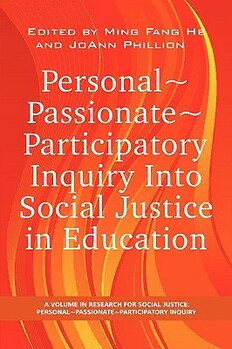
Personal Passionate Participatory Inquiry Into Social Justice in Education (PB) PDF
Preview Personal Passionate Participatory Inquiry Into Social Justice in Education (PB)
Personal~Passionate~ Participatory Inquiry Into Social Justice in Education A volume in Research for Social Justice: Personal~Passionate~Participatory Inquiry Series Editors: Ming Fang He, Georgia Southern University JoAnn Phillion, Purdue University 2 Research for Social Justice: Personal~Passionate~ Participatory Inquiry Ming Fang He and JoAnn Phillion, Series Editors Personal~Passionate~Participatory Inquiry Into Social Justice in Education (2008) edited by Ming Fang He and JoAnn Phillion 3 Personal ~ Passionate ~ Participatory Inquiry into Social Justice in Education 4 Ming Fang He JoAnn Phillion 5 Library of Congress Cataloging-in-Publication Data Personal, passionate, participatory inquiry into social justice in education / edited by Ming Fang He and JoAnn Phillion. p. cm. -- (Research for social justice: personal, passionate, participatory inquiry) Includes bibliographical references. 9781607529309 I. He, Ming Fang. II. Phillion, JoAnn. LC191.4.P47 2008 303.3’ 72--dc 2008027250 6 Copyright © 2008 IAP–Information Age Publishing, Inc. All rights reserved. No part of this publication may be reproduced, stored in a retrieval system, or transmitted in any form or by any electronic or mechanical means, or by photocopying, microfilming, recording, or otherwise without written permission from the publisher. Printed in the United States of America 7 Table of Contents Personal~Passionate~ Participatory Inquiry Into Social Justice in Education Research for Social Justice: Personal~Passionate~ Participatory Inquiry Title Page Copyright Page ACKNOWLEDGMENTS FOREWORD CHAPTER 1 - PERSONAL~PASSIONATE~ PARTICIPATORY INQUIRY CHAPTER 2 - STITCHED FROM THE SOUL CHAPTER 3 - TEEN MOM CHAPTER 4 - RESILIENT LIVES CHAPTER 5 - SELF, OTHERS, AND JUMP ROPE COMMUNITY CHAPTER 6 - USING MULTICULTURAL LITERATURE TO DEVELOP EMPATHY AND COMPASSION IN PRESERVICE TEACHERS CHAPTER 7 - A CURRICULUM OF IMAGINATION IN AN ERA OF STANDARDIZATION CHAPTER 8 - A QUIET AWAKENING CHAPTER 9 - AFRICAN AMERICAN STUDENTS WITH READING DISABILITIES CHAPTER 10 - LANGUAGE, CULTURE, AND IDENTITY CHAPTER 11 - READING THROUGH BROWN EYES CHAPTER 12 - DALTON’S SUICIDE CHAPTER 13 - FOSTERING JUSTICE IN AN UNJUST WORLD CHAPTER 14 - IT STARTS AT HOME CHAPTER 15 - BECOMING AN AGENT OF SOCIAL CHANGE CHAPTER 16 - CONCLUSION: PERSONAL~PASSIONATE~ PARTICIPATORY INQUIRY EPILOGUE - A Love Letter to the Personal~ Passionate~Participatory Research Group ABOUT THE AUTHORS 8 ACKNOWLEDGMENTS Personal~Passionate~Participatory Inquiry Into Social Justice in Education, the first book in the series, Research for Social Justice: Personal~Passionate~Participatory Inquiry, is dedicated to all the people who have engaged in personal~passionate~participatory inquiry with us over the years—students, parents, teachers, educators, administrators, and community workers in various contexts. We deeply appreciate the experience and knowledge of the researchers featured in the book and their participants; their concerns for people who are marginalized and disfranchised; their long-term and heart-felt engagement in schools, families, and communities; their shared efforts driven by commitment to social justice; and their unfaltering stance on equity, equality, social justice, freedom, and human possibility. 9 FOREWORD William Ayers History charges forward—gyrating, wobbling, crashing, careening, drifting, stampeding, advancing. There is no stopping it—history is always on the move, always on the make. People are on the move and on the make as well—we slouch toward the next point on our journey, we arrive and just as quickly we stumble or dash from there to the next. We are, each of us, unfinished, incomplete, works-in-progress. “The streets are narrow and so are the minds,” Galileo announced as he prepared to overthrow the dogma of an orthodox church and state. His discovery that the planets and the stars were not—as had been thought —fixed to a crystal vault, but rather that they were spinning through space without visible support—like us, who are also on an immense journey, also free and without support—brought him into direct and fatal conflict with authority. Forced to denounce his discovery and betray his principles, Galileo’s last words nonetheless stood up for truth: “Still, it moves,” he said. Even the most casual glance backward offers a big-letter lesson: all that is solid melts into air; the center cannot hold; the way things are is not, can never be, the way things will always be. The dance of the dialectic is underway and ongoing. History moves. We are led to believe—by authority, by common sense, by existential experience—that we are living somehow at a point of arrival, the end-point of history: all that has occurred until now brings us inevitably to this time, this place. And pretty much this is simply the way it is, the way it must be. We retract into passivity, cynicism: What can I do about it? we ask with a resigned shrug. Whatever, we sigh. But it’s a choice. We can note that the current moment is neither inevitable nor stable, that its imperfections—the unnecessary suffering, the undeserved pain—might be cause for alarm. Our situations are neither fixed nor entirely determined, and history has not stood still for us—another world is both possible and inevitable: Get up, get up, get moving. We can choose to resist passivity and cynicism, to plant the seeds of a world in-the-making. We can learn to create—right here, right now—a bit of the world we want to inhabit. Ming Fang He and JoAnn Phillion with this book provide a map into a new territory of inquiry: personal~passionate~participatory. The rhythm is intentional, for they intend to break old barriers and break 10
